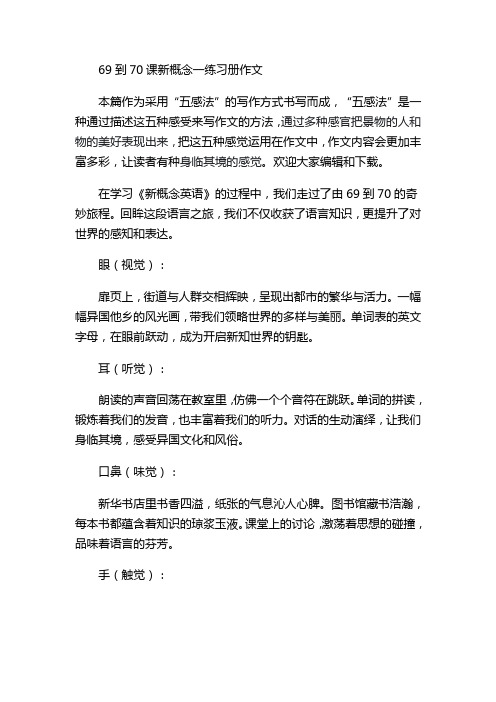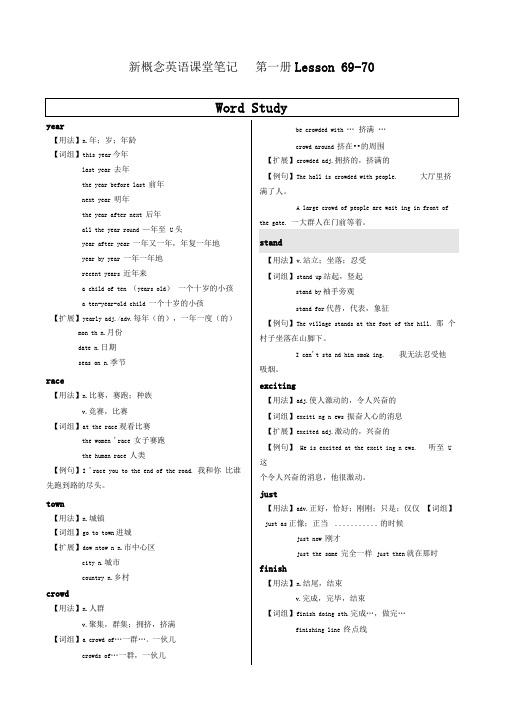新概念英语第一册69-70课
69到70课新概念一练习册作文

69到70课新概念一练习册作文本篇作为采用“五感法”的写作方式书写而成,“五感法”是一种通过描述这五种感受来写作文的方法,通过多种感官把景物的人和物的美好表现出来,把这五种感觉运用在作文中,作文内容会更加丰富多彩,让读者有种身临其境的感觉。
欢迎大家编辑和下载。
在学习《新概念英语》的过程中,我们走过了由69到70的奇妙旅程。
回眸这段语言之旅,我们不仅收获了语言知识,更提升了对世界的感知和表达。
眼(视觉):扉页上,街道与人群交相辉映,呈现出都市的繁华与活力。
一幅幅异国他乡的风光画,带我们领略世界的多样与美丽。
单词表的英文字母,在眼前跃动,成为开启新知世界的钥匙。
耳(听觉):朗读的声音回荡在教室里,仿佛一个个音符在跳跃。
单词的拼读,锻炼着我们的发音,也丰富着我们的听力。
对话的生动演绎,让我们身临其境,感受异国文化和风俗。
口鼻(味觉):新华书店里书香四溢,纸张的气息沁人心脾。
图书馆藏书浩瀚,每本书都蕴含着知识的琼浆玉液。
课堂上的讨论,激荡着思想的碰撞,品味着语言的芬芳。
手(触觉):手指轻抚书本,感受纸张的纹理和厚度。
钢笔在纸上流畅地书写,留下一行行工整的笔记。
单词卡在手中翻阅,一枚枚词汇在记忆中扎根。
大脑(最强的感觉器官):大脑是指挥中心,统筹着感官的协调运作。
它将视觉、听觉、嗅觉、触觉和味觉的信息整合,构筑起我们对世界的完整体验。
学习《新概念英语》的过程,不仅锻炼了感官,更促进了大脑的思维和想象。
通过五感法的运用,我们能够捕捉到学习过程中的细节,赋予作文鲜活而生动的色彩。
让感官成为我们观察和表达的桥梁,从而写出更丰富、更令人印象深刻的文章。
新概念英语第一册69-70课 the car race

Lesson 69
The car race
Words
crowd town race exciting behind year winner stand finish way just
单词学习
• • • • • • • • • • • year race town crowd stand exciting just finish winner behind way n. 年 n. 比赛 (强调竞技性强、激烈的) n. 城填 n. 人群 v. 站立 adj. 使人激动的 adv. 正好,恰好 n. 结尾,结束 n. 获胜者 prep.在……之后 n. 路途(抽象)
the hairdresser’s
Complete these sentences using at, on or in .
at on 1. We were _____ the stationer’s_____ Monday . at 2. We were there ____ four o’clock . in in 3. They were____ Australia____ September. in 4. They were there ______ spring . On in 5. ___November 25th,they were ____ Canada. in 6. They were there _____ 1990 .
Learn the text
Read and answer the questions:
Is there a car race in our town every year?
Yes, there is. Was there a very big car race in 1998? No, there wasn’t. How many people were there? There were hundreds of people there. How many cars were there in the race? There were twenty cars in the race. Who was the winner? The winner was Billy Stewart.
新概念课堂笔记第一册Lesson69-70

新概念英语课堂笔记第一册Lesson 69-70year【用法】n.年;岁;年龄【词组】this year今年last year 去年the year before last 前年next year 明年the year after next 后年all the year round —年至U头year after year 一年又一年,年复一年地year by year 一年一年地recent years 近年来a child of ten (years old)一个十岁的小孩a ten-year-old child 一个十岁的小孩【扩展】yearly adj./adv.每年(的),一年一度(的)mon th n.月份date n.日期seas on n.季节race【用法】n.比赛,赛跑;种族v.竞赛,比赛【词组】at the race观看比赛the women 'race 女子赛跑the human race 人类【例句】I 'race you to the end of the road. 我和你比谁先跑到路的尽头。
town【用法】n.城镇【词组】go to town进城【扩展】dow ntow n n.市中心区city n.城市country n.乡村crowd【用法】n.人群v.聚集,群集;拥挤,挤满【词组】a crowd of…一群…,一伙儿crowds of…一群,一伙儿be crowded with … 挤满…crowd around 挤在••的周围【扩展】crowded adj.拥挤的,挤满的【例句】The hall is crowded with people. 大厅里挤满了人。
A large crowd of people are wait ing in front of the gate. 一大群人在门前等着。
【用法】v.站立;坐落;忍受【词组】stand up站起,竖起stand by袖手旁观stand for代替,代表,象征【例句】The village stands at the foot of the hill. 那个村子坐落在山脚下。
(完整版)新概念英语一册69-70课习题

基础达标一单词拼写1.路途 ________________________2.人群_________________________3.站立 ________________________4.使人激动的___________________5.年 __________________________6.结尾_________________________7.获胜者 ______________________8.在……之后___________________9.城镇 ________________________ 10.比赛________________________二选择( )1.Miss Green goes to the doctor’s _____ Monday morning.A. onB. inC. at( )2. Gina was born ______ 1999.She is old enough to go to school.A. toB. onC. in( )3. It’s hot ____summer in Beijing.A. byB. onC. in( )4.My aunt arrived here _____ a warm spring morning.A. inB. onC. by( )5._____ the evening of May 31, the 2002 FIFA World Cup started in South Korea.A. OnB. AtC. Of( )6. Charles Dickens _____ a lot of novels.A. writeB. wroteC.writes( )7.Several _____ students came to the meeting.A. thousand’sB. thousandsC. thousands of( )8.----Who washed the plates on the table? ----Jenny ____.A. didB. wasC. had( )9. Mike had nothing for breakfast, ____ ?A. does heB. did heC. didin’the( )10.____ football fans are queuing to buy the tickets for the football match.A. Two thousandsB. Thousands ofC. Thousand of( )11.Liu Xiang won the first prize in the men’s 110 meters’ hurdles ___.A. raceB. matchC. competition( )12.Dongdong Monitor of Class One, won the top prize in the Speech ___.A. ContestB. CompetitionC. Match( )13. ______, what did you do in the past?A. In the wayB. By the wayC. On the way( )14. The poor kid was lost ____ to the Zoo.A. on his wayB. by his wayC. in his way( )15. He finished ____ his homework at 10 o’clock last night.A. to doB. doingC. do能力提升三阅读One very hot day, a hungry fox went into a vineyard(葡萄园) looking for food. The grapes were heavy and ripe, hanging in beautiful purple clusters(串) on the river.“Oh!” he said,“I must taste those grapes.” So he made a jump, but he could not reach them.“I must try again,” he said, and this time he jumped higher than the first time. But the grapes were still out of his reach.At last, quite tired out, he said:“Who wants grapes like those, anyway? Anyone can see they are as sour as green lemons.” He tried to comfort himself by saying so.( )1.The fox is very hungry.( )2.For the second time, the fox could reach those grapes.( )3. The fox was very tired.( )4.At last the fox ate those grapes.( )5.The grapes are as sour as green lemons.四连词成句1. did get last bad she cold a week_________________________________________________2. we last the Summer didn’t Palace visit Sunday_________________________________________________3. I trip anywhere on go the day of las t my to didn’t Chengdu_________________________________________________4. did make last she mistakes many time_________________________________________________5. -----when visitors the did in arrive Beijing----two ago hours_________________________________________________五翻译1.每年在我的家乡都有一次汽车比赛。
新概念英语第一册Lesson69-70课件

There __w_a__s_ no milk in that cup last night. People__a_r_e__interested in funny films these days.
There_______ an old tree in my garden 10 years ago. Our villages______ poor and small in 1980s.
描述一下
There were some sheep on the road .
描述一下
There _____ _____ trees near the lake .
描述一下
There were some trees near the lake .
描述一下
There _____ _____ snow near the lake .
The book was on the shelf yesterday. 改成否定句: The book wasn‘t on the shelf yesterday.
The girls in red were in the shop two hours ago. 改成一般疑问句: Were the girls in red in the shop two hours ago?
The girls in red were in the shop two hours ago. 改成一般疑问句:
The phone was in her pocket ten minutes ago. 划线部分提问:
The book was on the shelf yesterday. 改成否定句: The book wasn‘t on the shelf yesterday.
新概念英语第一册Lesson69-70笔记(语法点+配套练习+答案)

last year去年
Thereare(be) a lot of tourists here every year.
Thereare going to be(be) four million tourists here this year.今年将会有四百万的游客。
Therewere(be) more than three million tourists last year.
在回家的途中
on the left
在左边
at the stationer’s
在文具店
5、语法解析
1.in, on, at
at10 o’clock
inthe evening
atnoon
atChristmas
onthe evening of
Monday
in2009
onApril 1st
inthe spring
There areseven hundredstudents in my school.
我们学校有700个学生。
4、词组
car race
赛车比赛
an exciting finish
激动人心的结尾
hundreds of
数以百计的
five other cars
其他5辆车
in the crowd
在人群里
on the way home
黑板前站着一个老师。
I can’t stand my boss. He is too bossy.
我忍受不了我老板了。他太专制了。
exciting adj.令人兴奋的
excited adj.感到兴奋的
-ing修饰物
新概念英语第1册第69-70课重点语法

新概念英语第1册第69-70课重点语法新概念英语第1册第69-70课重点语法第69-70课的内容:一、重要句型或语法1、普通过去时表示过去发生的而现在已经结束的动作或状态。
本课主要学习的是There was/There were的用法,如:In 1995, there was a very big race. / There were hundreds of people there.2、介词:各种时光的表达1)in:普通后接月,份、季度和年份,如:in May, in summer, in 2022。
也会用于某些短语,如:in themorning/afternoon/evening。
2)on:普通后接详细日期或星期,表示详细哪一天。
如:on July 1st, 1921/on Saturday。
3)at:普通后接详细时刻,表示几点几分。
如:at 7o'clock/at 7:35。
二、课文主要语言点There is a car race near our town every year.1)可复习there is/are和普通现在时的用法。
2)race普通表示竞速类的竞赛。
注重区别race与match(球类运动竞赛等)。
There were hundreds of people there. hundreds of表示成百上千、数以百计,是一种概数。
假如要表达确定的数字,普通用作:基数词+hundred+名词,如:five hundred students,注重hundred 不能用复数,也不能再后接of。
My wife and I were at the race. be at the race,表示在比赛现场、观察竞赛。
Our friends Julie and Jack were there, too. Julie and Jack作为myfriends的同位语,补充说明我的伴侣叫什么名字。
新概念英语第一册第69-70课

Words
year
race town
exciting
stand
finish crowd
words
winner just
way
behind
(1) year: n. ① 年。
this year 今年 last year 去年
next year 明年 every year 每年
No, there wasn’t.
It’s time to watch.
There is a car race
汽车比赛
near our town every year.
每年 (1)a horse race 赛马 a 10-mile race 10英里赛跑 a boat race 划船赛跑 注:当race表示比赛时,是可数名词,前面要 加不定冠词“a”。
the year before last 前年
the year after next 后年
(1) year: n. ②岁数。
基数词 + year (s) + old e.g. My friend’s mother’s 40 years old.
How old are you? I’m 11 years old.
It was an exciting finish.
(1)在以元音发音开头的单词前, 要用不定冠词an。 an exciting race 一场激动人心的比赛 an exciting film 一部激动人心的电影 (2)it: 指代the car race。
The winner was Billy Stewart.
介词 at
1、用介词at的时间短语通常表示: 确切的时间、具体时刻(at 10 o’clock 10点整) 用餐时间(at lunchtime 午餐时间)
- 1、下载文档前请自行甄别文档内容的完整性,平台不提供额外的编辑、内容补充、找答案等附加服务。
- 2、"仅部分预览"的文档,不可在线预览部分如存在完整性等问题,可反馈申请退款(可完整预览的文档不适用该条件!)。
- 3、如文档侵犯您的权益,请联系客服反馈,我们会尽快为您处理(人工客服工作时间:9:00-18:30)。
There is a car race near the writer's town every year. In 1995, there was a very big race.
Let' go and have a look.
Words
year [jə:] n. 年
race [reɪs]
town [taʊn] crowd [kraʊd] stand [stæ nd]
England
France
Germany
• There were twenty cars in the race. There were English cars, French cares, German cars. Italian cars. American cars and Japanese cars.
• on the way to · · ·
on the way to school on the way to airport on the way home
去· · ·路上
去学校的路上 去机场的路上 回家的路上
• There is a car race near our town every year. In 1995, there was a very big race.
France
Germany
• There were twenty cars in the race. There were English cars, French cares, German cars. Italian cars. American cars and Japanese cars.
Italy
1. 2. 3. 4. 5. 6. We were____the stationer’s____Monday. We were there___four o’clock. They were___Australia___September. They were there___spring. ___November 25th, they were___Canada. They were there___1990.
There were hundreds of people there. thousands of ... 成千上万的...
成百上千的
hundreds of
• • • • hundred / thousand 1 hundred/ 2 hundred …… 1 thousand / 2 thousand …… 如果前面有具体数字,则不加s,
Thursday Butcher's
Friday Grocer's
Saturday Dairy's
There was an apple on the table yesterday .
There be
一般现在时
单:There is a/ an … 复:There are some …
一般过去时
单:There was a/an … 复:There were some …
Lesson 70
When were they there?
Italy
America
Japan
4
finish line
It was an exciting finish. The winner was Billy Stewart. He was in car number fifteen. Five other cars were just behind him.
总结
• 【in】是“大姐”,因为后面所接的都是 较长时间(月、年、季节等)。 • 【on】是 “二姐”,后面所接的时间多与 日期有关(星期、日期、具体时间、纪念 日等)。 • 【at】是“小妹”,因为接在后面的时间 最短(具体时刻或某短暂时间)。
on
Monday Stationer's
Tuesday Wednesday Greengrocer Hairdresser' 's s
• There is a car race near our town every year. • In 1995, there was a very big race.
There is a car race
汽车比赛 每年
near our town every year.
a horse race 赛马 every day/ week/ Monday…
用介词in的时间短语:
一天中的某段时间(in the evening) 月份(in March) 年份(in 1997) 季节(in spring) 世纪(in the 20th century) 时期(in the holidays) 国家(in China)
用介词at的时间短语通常表示: 确切的时间(at 10 o’clock) 用餐时间(at lunchtime) 其他时刻(at noon/night) 节日(at Spring Festival【没有day的】) 年龄(at the age of 27) • 介词at可表示地点,通常用于某个小地点之前 at the butcher’s;at the office
1 5
Jimmy Lin
Jimmy is not only a singer. But also a racing driver.
Have you ever seen a car race?
The car race is very exciting. There are hundreds of people there. And there are so many cars in the race.
5
On the way home, my wife said to me, “Don’t drive so quickly! You are not Billy Stewart!”
be
现在式: am 过去式:
is
are
was
was
were
用 yesthurch now. I was at the church yesterday. 2. My son is at the school today. My son was at the school yesterday. 3. We are at the office now. We were at the office yesterday. 4. There is a bus on the road. There was a bus on the road yesterday. 5. Are there any cars here? Were there any cars here yesterday?
eg:
He was in car number fifteen. 在第15号车里 On the way home, my wife said to me… 在回家的路上
Lesson 69/ Class Two/ Page 137/ Bus NO.301... 在表示编了号的东西时,数字放在后面
• On the way home, my wife said to me, “Don’t drive so quickly! You are not Billy Stewart!”
In 1995, there was a very big race.
is 的过去式
在1995年
• • • •
There were hundreds of people there . My wife and I were at the race . Our friends Julie and Jack were there , too. You can see us in the crowd . We are standing on the left.
n. 比赛 (强调竞技性强、激烈的)
n. 城填 n. 人群 v. 站立
exciting [ɪkˈsa ɪtɪŋ] adj. 使人激动的
just [dʒʌst] finish ['fɪnɪʃ] winner ['wɪnə(r)]
adv. 正好,恰好 n. 结尾,结束 n. 获胜者
behind [bɪˈha ɪnd]
• exciting • excited adj. 令人激动的 adj. 某人感到激动的
“exciting”主语是某事、某物
“excited”主语是人 这场足球比赛非常激动人心。 The football game was very exciting . 看到妈妈,我很激动。 I was very excited when I saw my mom .
一般过去时态 There be(某处有某物)
There is--There are---
There was There were
书架上 有一本书。 有一些书。
There are is a book some books on the bookshelf .
yesterday
There ____ was ( is was ) a book on the bookshelf.
1
• There were hundreds of people there. My wife and I were at the race. Our friends Julie and Jack were there, too. You can see us in the crowd. We are standing on the left.
在人群中
在左面
• There were 20 cars in the race . There were English cars , French cars , German cars , Italian cars , American cars and Japanese cars .
